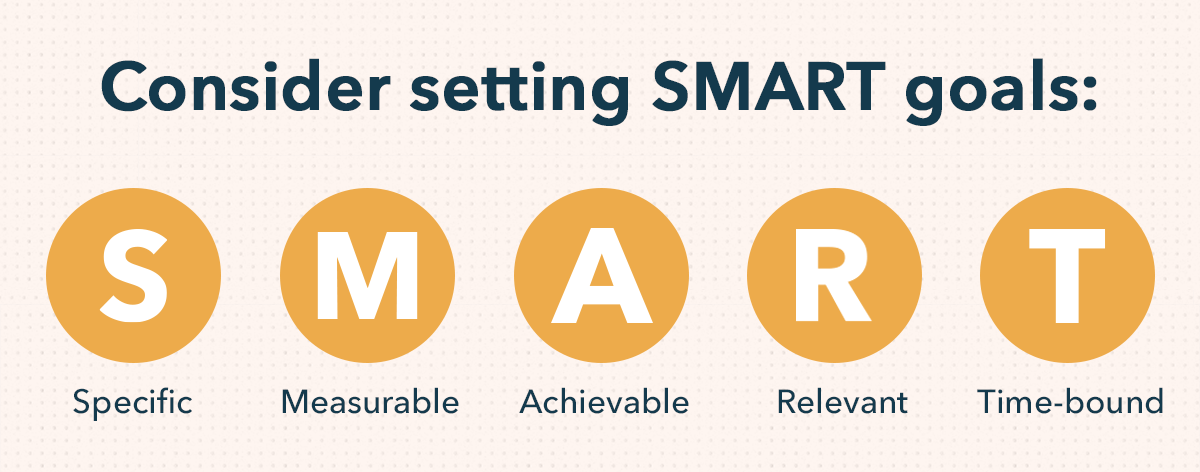Financial goals: examples, how to set them, and more

Save more, spend smarter and grow your money

Money can be stressful. When it comes to life goals, most people have financial goals that they want to achieve in their lifetime. Depending on your desired lifestyle or needs, your financial goals will look different from others. These goals can be anywhere from handling student loans or mortgages to trying to buy a new laptop for school. These goals are created for you and your fulfillment only!
Along with this, financial goals are valuable to everyone. Financial success in various aspects of life can be achieved with well thought out goals. There are many benefits to learning how to set financial goals – from reducing stress to achieving financial stability. However, if you haven’t set financial goals for yourself before or on a large scale, starting the process can lead to a lot of questions.
For example, which goals are short-term or long-term? How do I set a goal and how can I accomplish it? Are there any tools to help me achieve my financial goals? Whether you need some guidance on meeting the goals you have in mind or are just starting to think about setting financial goals, this guide can help you take the next steps. Continue reading or use the link below to get started.
What are the financial goals?
Financial goals include things like learning to budget, saving for retirement, building your credit, and making holistic plans for a financially stable future. Financial goals can be short-term, mid-term or long-term, but all aim to improve money management.
What are the financial goals?
Financial goals are simple in concept but they can be difficult to implement for some. In short, financial goals are the objectives you set for yourself that are centered around your personal finances. Whether it’s establishing a healthy savings, starting investing, or regulating your spending habits, your financial goals should be focused on improving your financial health.
Typically, financial goals are differentiated on the basis of the time taken to achieve them or how far into the future they are set. For example, financial goals can be: short-term, mid-term or long-term.

short term financial goals
Short-term financial goals can generally be achieved within one year to five years. Some examples are:
- buying new furniture
- creating a holiday fund
- Buying new electronics like a TV, computer or gaming console
- budget setting
- starting an emergency fund
- reduce debt
- saving for marriage
- pay for home renovation
medium term financial goals
Medium-term financial goals are usually set with a time period of around five years to ten years. These goals can be tied into short- and long-term goals by being able to achieve them in the distant future. Examples are:
- finding high paying jobs
- student loan payment
- investing in higher education
- saving for the first house
- maintain growth in investment
- pay a car
long term financial goals
Long-term financial goals are generally life goals that you can set for yourself in the future. Some common examples of long-term financial goals are:
- pay off your mortgage
- Saving for Your Children’s College Fund
- build your retirement savings
What are the benefits of setting financial goals
Financial goals are useful for all those who want to improve their quality of life and plan for the future. To help you see the true value of focusing on financial goals, let’s take a look at some of the most notable benefits:
Financial Freedom
Money is one of the biggest stressors in people’s lives. Therefore, when setting financial goals, most people aim to have a sense of financial independence. When your finances are in control and you have a strong understanding of what you want to achieve and how you can do it, you can feel more in control of what you want for your life and your future. .

inflation
Setting financial goals can help you deal with the impact of ever-changing inflation on your stability. With a plan, you can be better prepared for rising inflation, whether it means getting on track to earn a higher salary or saving more for retirement. Even the simple act of creating an emergency savings fund can help you through an uncertain economic period.
comfortable life
We all want to be as comfortable as possible, however, this usually depends on gaining control of our finances. Whether you want to upgrade your lifestyle or simply no longer want to live paycheck-to-paycheck, financial goals are an important part of financial planning. Setting goals like starting a monthly budget, increasing your savings, and figuring out ways to incorporate fun spending into your budget can help you live more comfortably than you are now.
celebrate your success
As with any type of goal, one of the major benefits of setting financial goals is the relief and excitement that comes from meeting them. After all your hard work and time, you can celebrate your determination and motivation paying off to accomplish the goal. Whether it is a short-term or long-term goal, once you achieve your goal aspiration, nothing can dampen the feeling of accomplishment. You should be proud of yourself as you take steps towards better financial health.
how to set financial goals
Now that you know what kind of financial goals you want to achieve, it’s time to focus on how you can achieve those goals. There are many strategies and personal finance tips out there, but here are a few to consider.
smart goal set
SMART is an acronym for a strategy for setting goals that are highly attainable. In short, SMART means: Specific, Measurable, Attainable, Realistic and Time-bound. These points are tips for having a more targeted goal when it comes to your personal finances. Let’s find out what each letter really means when it comes to setting your own goals.

Specific: Aim to make your goals clear so you don’t lose focus. Important questions to ask yourself during this stage are: what, why, who, where and what resources are involved?
Measurable: You need to be able to track your goals and progress in order to stay motivated. This means having a time limit or measurable milestone so you know how close you are to reaching the goal.
Attainable: This means making your goals realistic based on where you are now. You want to push yourself but you don’t want to choose goals that are not achievable.
Relevant: You want to choose a goal that is related to what you want to achieve in terms of your financial well-being and that is meaningful to you.
Time bound: Setting a time frame for how long it will take to accomplish each of your goals is the key to increasing your chances of achieving them. Keeping a set end date in mind can help you stay on course and adjust how you tackle your goal over time.
decide what is important to you
Your goals should generally be based on your priorities. There is a lot of financial advice out there that may say you need to do this or this, but at the end of the day, it all depends on your circumstances and the financial concerns that are most important to you. Depending on what you want to achieve, whether it’s big dreams or lifestyle changes you can make now, the goals you set and the steps you’ll need to take to reach them will shape accordingly.

understand your budget
Looking at your current budget before setting financial goals can help you determine what is realistic based on the situation you are in now and where your financial well-being needs to work. Your budget is also a useful tool while maintaining your goals. For example, if one of your main objectives is to save six months of living expenses as your emergency fund, you need to work that savings goal into your budget and allocate more of your income to that category.
How can you reach your financial goals
Here are some tips for how you can reach your financial goals;
Develop a system for tracking goals
Tracking goals lets you see how much progress you’ve made and ensure you’re on pace to meet them. Visualizing your progress however it suits you can serve as inspiration to see how far you have come in your financial journey. This could be a visual of having a financial planner to mark your progress or something more high-tech.

Use the tools and resources available to you
If you’re unsure where to start setting financial goals and stay on track with them, you have a variety of tools and resources to help you get started. There are various tools and resources to help you achieve your goals. For example, the Mint app. From budget trackers to spending analysis, the Mint app can be an asset to help you build better financial habits and work towards your goals.
Adjust your goals as needed
With everyone’s financial situation being different, there should be no shame in adjusting your goals. Your goals should meet your own timeline and needs. In everyday life, situations and emergencies can happen without notice, which can significantly affect your financial situation. Or maybe, your priorities have changed. Whatever the reason, it’s okay to change or change your goals over time, especially those with a wider scope or longer time frame.
be persistent
It may sound obvious but it is important to work consistently towards your financial goals. Improving your finances, paying off debt and saving money all take time, but working for them and staying motivated is the only way to achieve those goals.
take your time
While some goals are time-sensitive, such as short-term financial goals, other goals can be achieved in your own time. Goals are for your own personal success and you can give yourself grace when it comes to accomplishing them. Some will have short-term goals that may exceed your mid-term or long-term goals and vice versa. As stated earlier, everyone has their own vision for their financial future and it is on a different timeline.
Prepare for a successful financial future with concrete goals
Finance can be a scary topic to think about, especially when it’s about your own personal goals. Trying to achieve them can be even more difficult without a clue of where to start. A well thought out plan with clear steps is a good start to setting your goals for future financial success.
For more help in setting and achieving your financial goals, explore the Mint app for all your financial needs and concerns.
More resources for achieving financial goals:
Get tips to increase your credit score.
Create a customized budget to track spending.
Figure out how much you need to save to withdraw.
Learn how you can start investing in stocks.






